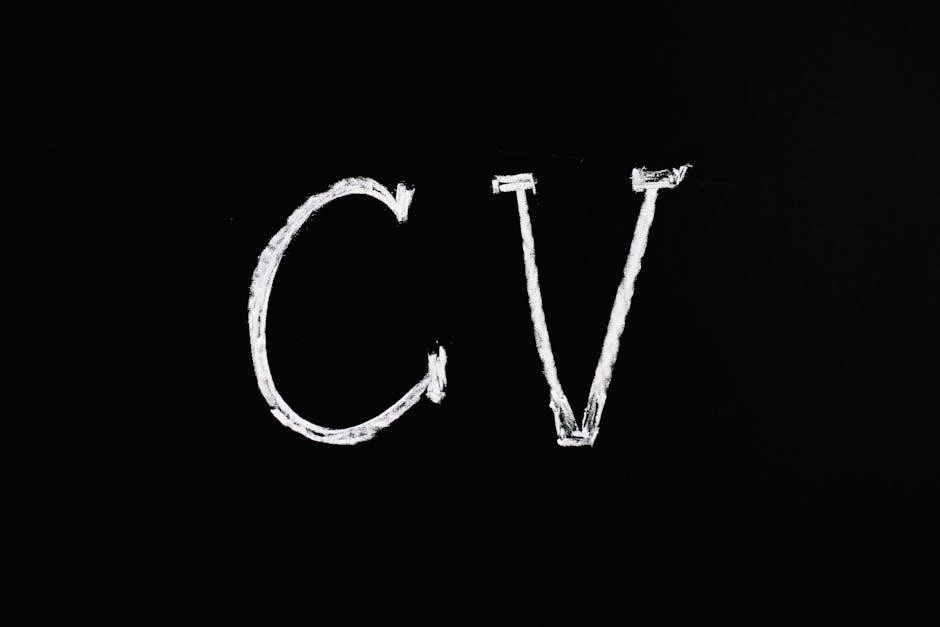
cv node.js -templates -samples filetype:pdf
A well-structured CV for Node.js developers is essential to showcase technical expertise and experience. It highlights proficiency in JavaScript, Node.js frameworks, and tools, demonstrating a strong understanding of backend development. A Node.js CV should emphasize relevant projects, skills, and achievements, aligning with modern industry demands to stand out in a competitive job market.
1.1 Importance of a Well-Structured CV for Node.js Developers
A well-structured CV is crucial for Node.js developers to showcase their technical expertise and stand out in a competitive job market. It effectively highlights programming skills, experience with Node.js frameworks, and proficiency in JavaScript. A clear and organized CV helps recruiters quickly identify relevant qualifications, such as backend development experience and familiarity with tools like npm. Additionally, it demonstrates a developer’s ability to work on projects requiring scalability and performance. Using professional templates or samples can ensure the CV is both visually appealing and content-rich, making it easier to land interviews for Node.js-related roles.

1.2 Overview of Key Sections in a Node.js Developer CV
A Node.js Developer CV should include essential sections to highlight relevant skills and experiences. Key sections encompass Contact Information, a Professional Summary, and a Technical Skills section listing Node.js, JavaScript, and related frameworks. Work Experience should detail achievements in backend development, while Education and Certifications showcase formal training. Projects and Portfolio sections allow showcasing practical applications of Node.js expertise. Using a clean and professional template, such as a PDF format, ensures readability and a modern look, making the CV more appealing to potential employers in the tech industry.

Essential Sections in a Node.js Developer CV
A Node.js Developer CV must include Contact Information, a Professional Summary, Technical Skills, Work Experience, Education, and Projects. These sections highlight expertise and achievements effectively.
2.1 Contact Information and Personal Details
Your Node.js Developer CV should begin with clear contact information, including your name, email address, phone number, and location. Adding a link to your GitHub profile or portfolio is highly recommended, as it showcases your projects and coding skills. Ensure your LinkedIn profile or personal website is included if applicable. Keep this section concise and professional, avoiding unnecessary details. Use a clean format to make it easy for recruiters to reach out. Double-check for typos to maintain a polished appearance. This section sets the first impression, so accuracy and clarity are crucial for making a strong start.
2.2 Professional Summary or Objective Statement
The Professional Summary is a concise overview of your experience and skills as a Node.js Developer. It should highlight your expertise in JavaScript, Node.js frameworks, and backend development. Mention your ability to build scalable and efficient applications, as well as your experience with tools like npm, Express.js, or MongoDB. Tailor this section to the job description, emphasizing your problem-solving skills and passion for delivering high-quality solutions. Use action verbs and quantifiable achievements to make your summary engaging and impactful, showcasing your value as a candidate in the competitive tech industry.
2.3 Technical Skills Section
The Technical Skills section is vital for showcasing your proficiency in Node.js and related technologies. List core skills like Node.js, JavaScript, and frameworks such as Express.js or Nest.js. Include tools like npm, Git, and databases like MongoDB or PostgreSQL. Mention APIs, microservices, and cloud platforms like AWS or Docker if relevant. Organize skills categorically for clarity, such as “Backend Development” or “Databases.” Highlight your expertise level (e.g., beginner, intermediate, advanced) to give recruiters a clear understanding of your capabilities. This section should be concise, relevant, and aligned with the job requirements.
2.4 Work Experience and Achievements
The Work Experience and Achievements section is critical for demonstrating your hands-on expertise in Node.js development. List your previous roles, emphasizing responsibilities and accomplishments related to Node;js projects. Use action verbs like “developed,” “designed,” or “optimized” to describe your contributions. Quantify achievements, such as “improved API response time by 40%” or “scaled server capacity by 3x.” Highlight technologies used, like Express.js, MongoDB, or Docker, and mention specific outcomes, such as successful deployments or performance enhancements. This section should clearly showcase your ability to deliver impactful solutions in real-world scenarios.

2.5 Education and Certifications
Your Education and Certifications section should highlight formal education and additional training relevant to Node.js development. List degrees in Computer Science, Information Technology, or related fields. Include certifications like Node.js Foundation Certified Developer or JavaScript certifications from platforms like Coursera or Udemy. Mention any workshops, bootcamps, or online courses that strengthened your Node.js skills. Specify the issuing authority and completion date for each certification. This section demonstrates your commitment to continuous learning and validates your expertise, making you a more credible candidate in the competitive tech industry.
2.6 Projects and Portfolio
Your Projects and Portfolio section should showcase your hands-on experience with Node.js. Highlight specific projects where you utilized Node.js, such as building RESTful APIs, real-time applications, or microservices. Mention technologies like Express.js, Socket.io, or MongoDB. Quantify achievements, such as improving performance or scaling applications. Include links to GitHub repositories or live demos to allow employers to review your work. Emphasize open-source contributions if applicable. This section demonstrates your practical skills and ability to deliver impactful solutions, making your CV stand out to potential employers.

Best Practices for Writing a Node.js Developer CV
Highlight Node.js proficiency, tailor your CV to job descriptions, and use action verbs. Quantify achievements, ensure clarity, and maintain a professional format to impress employers.
3.1 Tailoring Your CV to the Job Description
When applying for Node.js roles, tailor your CV by aligning your skills and experiences with the job description. Highlight relevant frameworks, libraries, and tools mentioned in the job posting. Emphasize specific projects or achievements that demonstrate expertise in areas like backend development, API integration, or performance optimization. Use keywords from the job description to ensure your CV passes through Applicant Tracking Systems (ATS). This targeted approach increases the likelihood of catching the hiring manager’s attention and showcasing your suitability for the role.
3.2 Highlighting Node.js Specific Skills
In your CV, clearly highlight Node.js-specific skills such as proficiency with JavaScript, Express.js, RESTful APIs, and module management using npm. Mention experience with asynchronous programming, event-driven architecture, and performance optimization. Include familiarity with tools like PM2 and Webpack. Tailor your skills section to emphasize Node.js frameworks and libraries relevant to the job, such as Koa.js or Hapi. Quantify achievements, like improving application performance or scaling backend services. This focus ensures recruiters recognize your expertise in Node.js development and its ecosystem.

3.3 Using Action Verbs and Quantifiable Achievements
Enhance your CV by using action verbs like “developed,” “optimized,” and “implemented” to describe your Node.js projects and roles. Quantify achievements, such as “reduced API response time by 40%” or “increased application throughput by 30%.” Provide specific metrics, like “managed 1 million+ requests per day” or “built a system supporting 10,000 concurrent users.” This approach demonstrates tangible impact and showcases your technical prowess. Use percentages, numbers, or scale to highlight efficiency improvements, proving your value as a Node.js developer and making your CV stand out to recruiters.

Popular Node;js Developer CV Templates and Samples

Explore modern, minimalist, and creative CV templates designed for Node.js developers. Find professional PDF samples on GitHub and other platforms to showcase your skills effectively.
4.1 Modern and Minimalist Templates
Modern and minimalist Node.js CV templates are designed to prioritize clarity and readability. These templates feature clean layouts, neutral color schemes, and simple typography, ensuring your skills and experience stand out. They often include sections for technical skills, projects, and professional summaries, tailored to highlight Node.js expertise. Popular platforms like GitHub and CVDesigner.ai offer free, downloadable PDF templates that cater to developers, providing a professional and polished look. These templates are ideal for showcasing your proficiency in Node.js without overwhelming the reader with unnecessary design elements.
4.2 Creative and Professional Designs
Creative and professional CV designs for Node.js developers blend innovation with sophistication. These templates incorporate subtle gradients, infographics, and modern fonts to visually highlight technical skills and achievements. While maintaining a professional look, they allow for personalization, making your CV unique. Platforms like CVDesigner.ai offer templates that balance aesthetics with functionality, ensuring readability while showcasing your Node.js expertise. These designs are perfect for standing out in a competitive job market, offering a visually appealing way to present your experience and skills to potential employers.
4.3 Free PDF Templates for Node.js Developers
Free PDF templates for Node.js developers are widely available, offering customizable designs to showcase skills and experience. Websites like CVDesigner.ai provide modern, professional templates tailored for tech roles. These templates often include sections for technical skills, projects, and work experience, ensuring clarity and focus. GitHub repositories, such as node-resume, also offer open-source tools to generate polished CVs. These resources help developers create visually appealing, industry-standard resumes without cost, making it easier to highlight Node.js expertise and stand out in the job market.

Tools and Resources for Creating a Node.js Developer CV
Online CV builders like CVDesigner.ai and GitHub repositories such as tiborsaas/node-resume offer tools to create professional Node.js developer resumes, highlighting skills and experience effectively.
5.1 Online CV Builders for Node.js Developers
Online CV builders like CVDesigner.ai provide professional templates tailored for Node.js developers, offering customizable designs to highlight technical skills and experience. These platforms allow users to easily input details about programming languages, frameworks, and projects, ensuring a polished and modern resume. Many builders include features like real-time previews and downloadable PDF formats, making it simple to create a visually appealing CV. They often cater specifically to tech professionals, ensuring the final output aligns with industry standards and employer expectations in the competitive tech job market.
5.2 GitHub Repositories for CV Templates
Github offers numerous repositories providing professional CV templates tailored for Node.js developers. Repositories like tiborsaas/node-resume and aershov24/101-developer-resume-cv-templates provide modern and minimalist designs. These templates often include features like LaTeX formatting and Node.js-specific sections, ensuring a professional look. Many repositories are customizable, allowing developers to highlight their technical skills and project experiences. They also offer community support, making it easier for developers to create polished CVs that stand out in the competitive tech industry, while adhering to industry standards and best practices for resume writing;
5.3 Node.js Libraries for Generating CVs
Node.js libraries like node-resume simplify CV creation by allowing developers to generate professional resumes programmatically. These libraries provide templates and tools to format technical details, ensuring consistency and modern design. For example, tiborsaas/node-resume on GitHub enables users to create polished CVs with minimal effort. These libraries often support PDF exports and customization options, making it easy to highlight Node.js-specific skills and experiences. They are particularly useful for developers who prefer automation and want to ensure their CVs meet industry standards while standing out in the competitive job market.
Crafting a polished Node.js developer CV is crucial for standing out in the competitive tech industry. Highlight your skills, experience, and projects to secure your dream role effectively.
6.1 Proofreading and Editing Your CV
Proofreading and editing are critical steps in finalizing a Node.js developer CV. Ensure all sections are error-free and concise, avoiding typos and grammatical mistakes. Review your technical skills, work experience, and projects for clarity and relevance. Use tools like Grammarly or resume builders to refine your content. Pay attention to formatting consistency, especially in PDF templates, to maintain a professional appearance. Tailor your CV to highlight Node.js-specific skills and achievements, making it easy for recruiters to identify your expertise. A polished CV significantly enhances your chances of securing interviews and landing your desired role in the tech industry.
6.2 Customizing Your CV for Different Roles

Customizing your CV for different roles is essential to stand out in a competitive job market. Tailor your technical skills, work experience, and projects to align with the job description. Highlight Node.js-specific expertise for backend development roles or emphasize full-stack capabilities if required. Use keywords from the job posting to ensure your CV passes applicant tracking systems (ATS). Experiment with different PDF templates to match the company’s culture—modern designs for startups, minimalist layouts for corporate roles. This targeted approach increases the likelihood of catching the recruiter’s attention and landing an interview.
Leave a Reply
You must be logged in to post a comment.